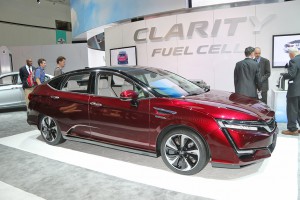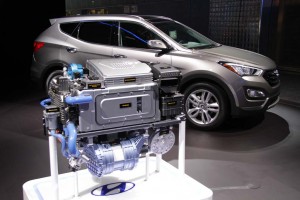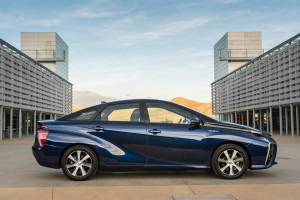
Honda revealed its Clarity fuel-cell vehicle in LA, and will put it into production later this year.
Honda has put a price tag on the new Clarity Fuel-Cell sedan it plans to launch in the U.S. later this year. For $60,000, you’ll be able to buy what proponents bill as the cleanest technology on the highway.
But what exactly is a fuel-cell, and where do you get the hydrogen needed to bill a vehicle that the Honda Clarity. With three of these vehicles set to be on sale by year-end, it’s probably a good time to get down to some of the basics. Here are 10 key questions – and answers – about fuel-cell technology.
Q: What exactly is a fuel-cell vehicle?
A: A fuel-cell vehicle is, in some ways, very similar to a battery car. Electric motors provide the traction. But instead of relying on a battery, the motors draw power from a device called a fuel-cell stack.
Q: But how does that stack work?
A: It forces hydrogen, normally stored in either liquid or gaseous form, through a permeable membrane coated with exotic metals like platinum and rhodium. That causes it to combine with oxygen from the air to form water vapor. In the process, electrons are stripped from the hydrogen atoms and used to power those electric motors.
(Honda sets price, plans for new Clarity fuel-cell vehicle. Click Here for details.)
Q: What’s the advantage? Why not just use a battery?
A: Current battery technology is expensive, heavy and limited in range. It also requires relatively lengthy charging cycles. Hydrogen-powered vehicles like the Honda Clarity, Toyota Mirai and Hyundai Tucson Fuel-Cell Vehicle can deliver as much as 300 miles on a tank of the gas, in line with what a gasoline-powered vehicle gets. And you can refill in three to five minutes. That’s why some proponents like to call fuel-cells “refillable batteries.”
Q: But where does the hydrogen come from?
A: The irony is that hydrogen is the most abundant element in the universe but relatively difficult to obtain in its pure form. Gasoline and natural gas, for example, are hydrocarbons, and you can get H2 by refining them. Another approach is to split water into its component atoms – two parts hydrogen, one part oxygen — most commonly through electrolysis. That’s a common high school science experiment.
Q: But if it comes from petroleum, is it clean and renewable?
A: It all depends. If you’re getting hydrogen from oil, natural gas or coal, you still create some CO2, though the emissions are generally cleaner than running gasoline through an internal combustion engine. If you use wind, solar or geothermal energy to electrolyze water then hydrogen is a truly zero-emission, renewable fuel. And remember, you have to generate the power used in a battery-car, too, so critics contend you are just displacing emissions from the tailpipe to a smokestack.
Q: What about nuclear energy?
A: An interesting approach that has been proposed would use excess heat from the latest nuclear generator technology. Instead of using electricity, H2O splits on its own when heated to something north of 900 degrees.

The Hyundai fuel cell stack shown in front of the Tucson. The entire package fits under the hood where a gas engine would normally go.
Q: How much does hydrogen cost? And is it cost-competitive?
A: The answer depends, in part, on the production method. The general consensus is a price of $5-$10 per kilogram (or 2.2 pounds). That could drop with newer production methods and higher production volumes.
To give that some perspective, the Toyota Mirai gets about 67 miles per kg. That would — at the figures quoted — work out to around 8 to 15 cents a mile. A comparably sized gasoline car getting, say 35 mpg, would cost less than 6 cents a mile at the current national average for gas. But if/when fuel returns to $4 or so, as is eventually likely, that would work out to 12 cents or so. Electricity is generally cheaper, especially if you use a time-based home plan to charge overnight. Charging at commercial chargers, the gap is smaller.
Q: I could charge my electric vehicle at home. Could I fill up my hydrogen car?
A: There have been prototype systems that would use a home’s natural gas supply to produce pure hydrogen. It would be cleaner, on a per-mile basis, than using gasoline, but not a true zero-emission fuel. But, as we noted, the electricity you use may be coming from coal or natural gas generators, too.
Q: Where would I get my hydrogen otherwise?
A: That’s the biggest problem. Right now, there are less than a score of hydrogen pumps available for consumer use in the country. It’s a bit of a chicken-and-egg problem. You need fueling stations to justify selling the cars, and vice versa. And that’s why vehicles like the Clarity and Mirai are only being sold in select markets, primarily Southern California. But California regulators have a plan to set up a statewide network of pumps by 2020, and several other states – and countries including Germany and Japan – are laying out similar plans.
(Lexus could put LF-FC hydrogen car concept into production by 2020. Click Here to check it out.)
Q: Are other automakers planning to offer fuel-cell vehicles?
A: Quite a few of them are, in fact. The list includes Daimler, which will have a Mercedes-Benz model ready next year, as well as Ford, Toyota’s Lexus brand, BMW and General Motors. GM is in a partnership with Honda and the two are reportedly planning to build and jointly operate a fuel-cell factory by 2025.
(For more on the GM-Honda fuel-cell factory, Click Here.)


For those who want to feel “green” then hydrogen fuel cell powered cars are as good as you can do. It matters not how many people buy EVs or hydrogen fuel cell powered cars as they won’t change the environment in any tangible way.
Thank you, for some answers. I like how hydrogen can be refilled quickly in a vehicle. But like with the military that required all vehicles and ships and airplanes and generators, even motorcycles use one type of fuel, diesel is made simple in transport and storage. 9nce a person has photovoltaic panels on their house the next step having a ev is pretty easy. But I wonder instead of using a fuel cell to power a electric motor, what about using hydrogen to power a internal combustion engine? I know BMW has had vehicles that could burn hydrogen or gasoline depending on availability of hydrogen. I
understand that academics just simply dont like the ice. With hydrogen the engine doesnt need any pollution control devices or very minimal. Just has water coming out the exhaust.
Fuel-Cell Madness…SLAP!…Thanks I Needed That!
http://www.theautochannel.com/news/2016/01/21/185727-slap-face-thanks-i-needed-that.html
The lies that the politicians in DC constantly spew about the U.S. being dependent on foreign oil shows how unscrupulous they are and how they intentionally dupe the public. The U.S. has more crude oil than it could use in the next 200 years and oil renews itself every 50-100 years. The only reason U.S. refineries import crude oil is for greater profit.
BTW, fuel cell powered cars will be for the few who feel a need to have an electric powered vehicle. Fuel cells are far more practical than batteries.